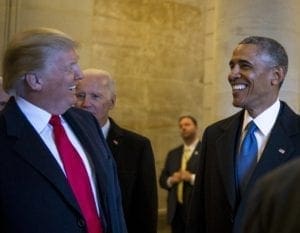By Changing U.S. Policy Toward Cuba, Barack Obama Got Something Right
This article was featured in our weekly newsletter, the Liberator Online. To receive it in your inbox, sign up here.
After more than 50 years of a failed foreign policy, President Barack Obama formally announced on Wednesday that his administration will re-open the United States Embassy in Havana, Cuba. The historic announcement comes nearly seven months after the administration set in motion the restoration of diplomatic ties with Cuba.
In 1961, the United States, under President Dwight D. Eisenhower, severed diplomatic ties with Cuba. The tiny island country located approximately 90 miles off from Miami had come under the control of a dictator, Fidel Castro, who’d risen to power more than two years prior by toppling Fulgencio Batista, who was friendly to the U.S. The next administration, under President John F. Kennedy, added to tensions by expanding sanctions against Cuba.
 Foreign policy experts praised the initial move. In December, Daniel Drezner, a professor of international politics at Tufts University’s Fletcher School of Law and Diplomacy, explained that the foreign policy approach toward Cuba had been a failure.
Foreign policy experts praised the initial move. In December, Daniel Drezner, a professor of international politics at Tufts University’s Fletcher School of Law and Diplomacy, explained that the foreign policy approach toward Cuba had been a failure.
“U.S. policy on Cuba has been, literally, isolationist — as in, it isolates the United States. Unlike other cases, there is zero multilateral support for sanctioning Cuba — quite the opposite, in fact,” Drezner wrote. “Improving ties with Havana ameliorates a long-standing source of friction between the United States and Latin America. That’s called ‘good diplomacy.’”
At a press conference on Wednesday, Obama said that the new approach “is not merely symbolic.”
With this change, we will be able to substantially increase our contacts with the Cuban people. We’ll have more personnel at our embassy. And our diplomats will have the ability to engage more broadly across the island,” he explained. “That will include the Cuban government, civil society, and ordinary Cubans who are reaching for a better life.”
While there are many entirely valid criticisms of the administration policies, particularly domestic policy, Obama got this one right. There are, of course, critics. Sen. Marco Rubio, R-Fla., whose parents left Cuba before Castro toppled Batista, slammed Obama, claiming that his administration handed Cuba a gift.
“Throughout this entire negotiation, as the Castro regime has stepped up its repression of the Cuban people, the Obama Administration has continued to look the other way and offer concession after concession,” said Rubio in a press release. “The administration’s reported plan to restore diplomatic relations is one such prized concession to the Castro regime. It remains unclear what, if anything, has been achieved since the President’s December 17th announcement in terms of securing the return of U.S. fugitives being harbored in Cuba, settling outstanding legal claims to U.S. citizens for properties confiscated by the regime, and in obtaining the unequivocal right of our diplomats to travel freely throughout Cuba and meet with any dissidents, and most importantly, securing greater political freedoms for the Cuban people.”
“I intend to oppose the confirmation of an Ambassador to Cuba until these issues are addressed. It is time for our unilateral concessions to this odious regime to end,” he added.
Similarly, Sen. Ted Cruz, R-Texas, in a press release of his own, said Obama is “rewarding one of the most violently anti-American regimes on the planet with an embassy and an official representative of our government.” Cruz, like Rubio, plans to stall the confirmation of any nominee to serve at ambassador to Cuba.
Sen. Jeff Flake, R-Ariz., however, was supportive of the policy shift. “It’s long past time for U.S. policy toward Cuba to be associated with something other than five decades of failure,” he said. “It is difficult to overstate the importance of resuming diplomatic relations with Cuba, in furthering our own national interests, benefiting our relations in the region, and encouraging a positive future for the Cuban people.”
The best way to promote the values of political and economic liberty is through open relations and free trade. Those who fail to realize this basic truth are, in reality, isolationists. As Cubans get see more economic liberty, they will desire more political liberty. It may take time, but that’s better than continuing an insane foreign policy approach that allows the Castros to make Cuba out to be victims.

























